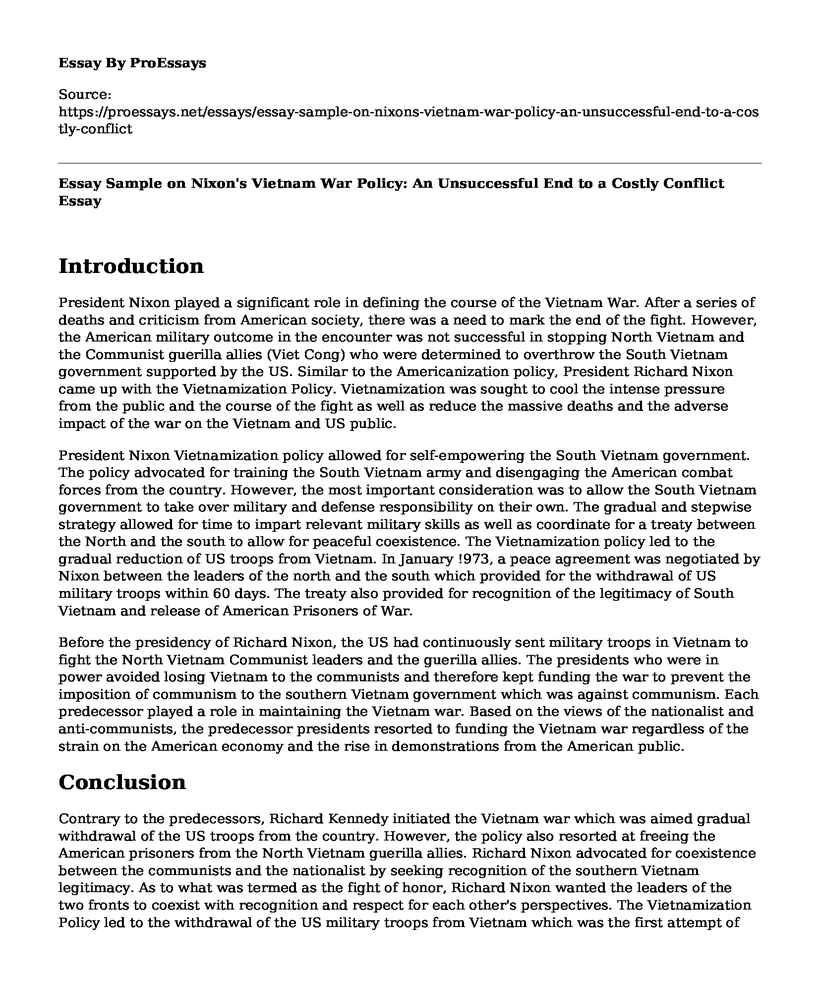Introduction
President Nixon played a significant role in defining the course of the Vietnam War. After a series of deaths and criticism from American society, there was a need to mark the end of the fight. However, the American military outcome in the encounter was not successful in stopping North Vietnam and the Communist guerilla allies (Viet Cong) who were determined to overthrow the South Vietnam government supported by the US. Similar to the Americanization policy, President Richard Nixon came up with the Vietnamization Policy. Vietnamization was sought to cool the intense pressure from the public and the course of the fight as well as reduce the massive deaths and the adverse impact of the war on the Vietnam and US public.
President Nixon Vietnamization policy allowed for self-empowering the South Vietnam government. The policy advocated for training the South Vietnam army and disengaging the American combat forces from the country. However, the most important consideration was to allow the South Vietnam government to take over military and defense responsibility on their own. The gradual and stepwise strategy allowed for time to impart relevant military skills as well as coordinate for a treaty between the North and the south to allow for peaceful coexistence. The Vietnamization policy led to the gradual reduction of US troops from Vietnam. In January !973, a peace agreement was negotiated by Nixon between the leaders of the north and the south which provided for the withdrawal of US military troops within 60 days. The treaty also provided for recognition of the legitimacy of South Vietnam and release of American Prisoners of War.
Before the presidency of Richard Nixon, the US had continuously sent military troops in Vietnam to fight the North Vietnam Communist leaders and the guerilla allies. The presidents who were in power avoided losing Vietnam to the communists and therefore kept funding the war to prevent the imposition of communism to the southern Vietnam government which was against communism. Each predecessor played a role in maintaining the Vietnam war. Based on the views of the nationalist and anti-communists, the predecessor presidents resorted to funding the Vietnam war regardless of the strain on the American economy and the rise in demonstrations from the American public.
Conclusion
Contrary to the predecessors, Richard Kennedy initiated the Vietnam war which was aimed gradual withdrawal of the US troops from the country. However, the policy also resorted at freeing the American prisoners from the North Vietnam guerilla allies. Richard Nixon advocated for coexistence between the communists and the nationalist by seeking recognition of the southern Vietnam legitimacy. As to what was termed as the fight of honor, Richard Nixon wanted the leaders of the two fronts to coexist with recognition and respect for each other's perspectives. The Vietnamization Policy led to the withdrawal of the US military troops from Vietnam which was the first attempt of ending the fight against communist take over of Vietnam. In this case, the Nixon Policy allowed for the withdrawal of the US troops marking an end of the long-fought military encounter between South and North Vietnam with the US in between the fight. Unlike the predecessors, Nixon's Policy put an end to the US direct involvement in the Vietnam War.
Cite this page
Essay Sample on Nixon's Vietnam War Policy: An Unsuccessful End to a Costly Conflict. (2023, Jan 05). Retrieved from https://proessays.net/essays/essay-sample-on-nixons-vietnam-war-policy-an-unsuccessful-end-to-a-costly-conflict
If you are the original author of this essay and no longer wish to have it published on the ProEssays website, please click below to request its removal:
- War Is a Racket (by Smedley D. Butler)
- Essay Sample on Japan and the Pacific War
- The Concept of Just War and Atomic Bombing of Hiroshima and Nagasaki Essay
- Research Paper on People Migrating From Villages to Towns During the Renaissance
- Exploring Ancient Greek Myths: Origins, Creatures & Heroes - Essay Sample
- Free Essay Sample on Deviance in 18th and 19th Century US: Incest and Social Control
- The Kemetic Concept of the Soul: Exploring Dimensions of Eternal Life - Paper Example







